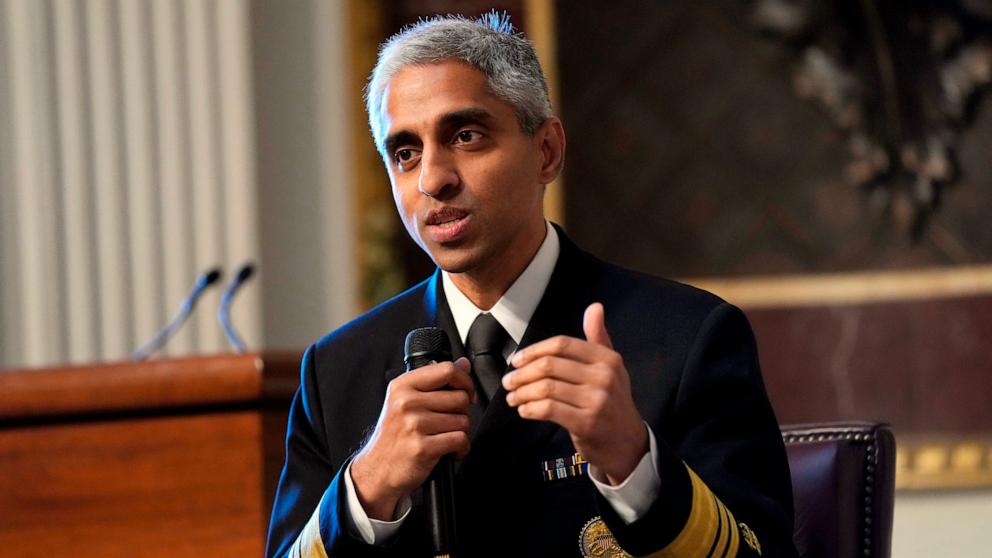Surgeon General Vivek Murthy, in an interview with ABC News' Elizabeth Schultz on Monday, said creating a Surgeon General's warning on social media was a necessary step in responding to “the defining public health challenge of our time.”
“We are living in the midst of a youth mental health crisis and I have said publicly that this is the defining public health challenge of our time. I firmly believe that. And social media has emerged as a significant contributor to the youth mental health crisis and there is an urgent need to make social media safer for kids – to warn kids and parents about the harms associated with social media,” Murthy said.
“This is part of addressing the wider mental health crisis that we're experiencing,” he said.
Surgeon General Dr. Vivek Murthy speaks at an event at the White House in Washington, April 23, 2024. Susan Walsh/Associated Press, File
The warnings will be displayed widely in social media feeds to raise awareness about the risks social media poses to young people's mental health, but implementation requires congressional action, followed by testing on optimal messaging and frequency of warnings, with the goal of “incentivizing behavior change,” Murthy said.
“Parents across the country have asked us questions about social media and they want to know if it is safe for children. Based on our research and discussions with experts across the country, we can conclude that, first, social media has not been proven safe for children. Second, there is growing evidence of harm associated with social media use,” Murthy told Schultz.
“So we want to make sure parents and kids know about that. And that's where warning labels come in handy.”
Echoing the arguments he made in an op-ed in The New York Times, Mursi said the issue was urgent because 95 percent of young people use social media.
“The data shows that kids who spend an average of three hours or more per day on social media have double the risk of anxiety and depression. That's pretty serious, but especially worrying when you consider that the average adolescent today is using it for 4.8 hours a day,” he said.
A warning from the U.S. Surgeon General appears on a pack of Camel cigarettes purchased at a Chicago-area newsstand on Nov. 30, 2012. Charles Rex Arbogast/AP
When tobacco warning labels were introduced in the United States in 1966, 42% of Americans smoked; today, that percentage is down to 12%, Murthy said. But the change took nearly 60 years and was just one step in a larger effort to educate and reform.
“We as a society are lagging behind in terms of ultimately making these platforms safer, but it's imperative that we start acting now, because the truth is, nothing is more important to the mental health and wellbeing of our children,” Murthy said.
“I say this not only as a surgeon general or a doctor, but as a father of two who is concerned, just like millions of parents, about the mental health and well-being of their children,” Murthy said.
Murthy said his children are not allowed to use social media until they graduate from secondary school, at which point he and his wife will review safety data, whether platform regulations are being implemented, and whether it is safe for their children to use social media.
For kids who are already using social media, the goal should be to create phone-free zones such as dinnertime, social times and bedtime, he said. He encouraged parents to create communities around the phone-free zones because “it's much easier if you do it collectively as a parent group.”
On a larger scale, Mursi acknowledged that the ball is in Congress's hands on both implementing the warnings and providing broader protections against the mental health risks of social media, particularly in a tense election year when legislative gridlock is the norm.
“But as a nation, we can take on the difficult task of protecting and safeguarding our children. We should be ready to take all measures to achieve that objective,” Murthy asserted.
Meanwhile, Murthy is committed to raising awareness in the hope that it will encourage parents and children to limit screen time.
“Again, ultimately making the platforms safer is key, but until that happens, it's important to make sure parents and children are aware of what we currently know from the medical and public health communities about the link between social media use and mental health harm.”



